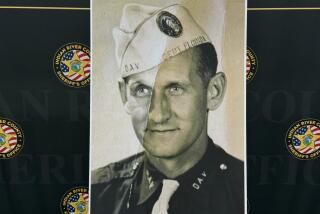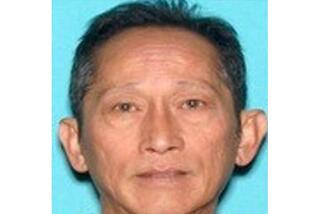Jerome Crowe, the FBI agent who delivered the ransom money in the Frank Sinatra Jr. kidnapping, dies at 93
Jerome Crowe, a former L.A.-based FBI agent who delivered the ransom money in the Frank Sinatra Jr. kidnapping and led a SWAT team in the bloody SLA shootout, has died after a long struggle with Alzheimer’s disease.
A lifelong law enforcement officer who is credited with assembling the FBI’s first SWAT team in Los Angeles, Crowe died Nov. 26 in Hawthorne, his son Jerry said. He was 93.
Crowe was also a noted firearms instructor, and the FBI Regional Tactical Training Center at the former El Toro Marine base in Irvine was renamed in his honor in 2011.
In 1963, Crowe was handpicked to take the lead in a case that quickly captured the nation’s attention — the kidnapping of Frank Sinatra’s 19-year-old son.
Sinatra, according to the biography “Sinatra: Behind the Legend,” had been contacted by the kidnappers, who initially seemed uncertain how much ransom money to demand. While Sinatra waited, the kidnappers finally settled on $240,000.
“What the hell?” Sinatra replied. “What kind of figure is that?”
Eager to have his son freed, Sinatra pulled the money out of the bank and the FBI photographed each bill. Then Crowe set off to make the ransom drop.
The agent was initially told to go to LAX, and then a gas station, and then another gas station. Finally, Crowe was instructed to drop off the attache case with the cash between a pair of school buses parked outside a Texaco station. Two undercover agents kept surveillance on the scene from an ice cream truck.
Sinatra Jr. was released quickly and the kidnappers — a trio of out-of-work house painters — were later arrested. Most of Sinatra’s money was recovered.
It was a grimmer scene a decade later when Crowe took a lead in the two-hour shootout with members of the Symbionese Liberation Army, a radical crew from the Bay Area that had made headlines after kidnapping Patty Hearst, the granddaughter of famed newspaper publisher William Randolph Hearst.
The shootout at a house in South Los Angeles was one of the fiercest gun battles in the city’s history, with thousands of rounds fired. More than 500 officers were called to the scene and the shootout was carried live on television.
In the end, the house caught on fire — perhaps from a tear gas canister or a bullet striking a Molotov cocktail — and six SLA members who’d holed up in the house were found dead. No law enforcement officers or civilians were injured, even though the neighborhood teemed with spectators during the spectacle.
But any hope of capturing Hearst, now regarded as a fugitive after participating in a bank robbery with SLA members, dissolved when the smoke cleared. She’d left the house the previous day.
Born Oct. 4, 1924, in Cocoa, Fla., Crowe was the youngest of three children. He played football and ran track and field in high school and then followed his brother into the Army in 1943 during World War II. He served in Europe and was discharged three years later.
After graduating from Stetson University in Central Florida, Crowe joined the FBI and was dispatched to Seattle, where his supervisor was Mark Felt, the career FBI man who was eventually identified as the Washington Post’s highly useful source “Deep Throat” in the Watergate scandal.
A year later, Crowe was reassigned to L.A., where he spent the rest of his career before retiring in 1979. He earned a master’s degree from Cal State Los Angeles and had a second career as the director of security for Gibraltar Savings & Loan.
In retirement, he and his wife Margarita traveled and he chased his passion for deep-sea fishing to Hawaii, Mexico and Alaska.
Crowe is survived by his wife; sons Bob and Jerry, a former Times staff writer; daughter Nancy Schoonover; and three grandchildren.
More to Read
Start your day right
Sign up for Essential California for the L.A. Times biggest news, features and recommendations in your inbox six days a week.
You may occasionally receive promotional content from the Los Angeles Times.







